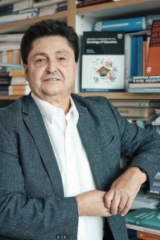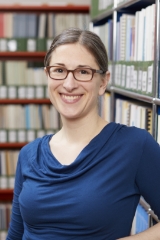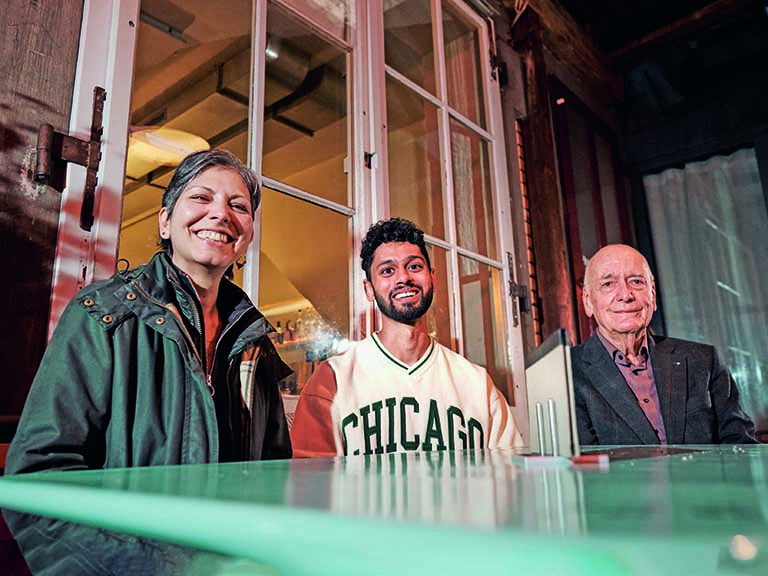Educational research
Who makes it to university is often predictable at birth
In Switzerland, a person’s career path depends not only on their academic performance, but also on their parents: With the same performance, children from academic families have twice as much chance of obtaining a university degree as children from non-academics.

“When asked who can make the transition from school to a university, most people would probably answer: It’s the talented and ambitious people of a year group who get through the bottleneck to high school and then through the eye of the needle to university,” says Rolf Becker, Professor at the Institute of Educational Science at the University of Bern. The statement already suggests that the reality is different. The long-term study TREE (Transitions from Education to Employment, see box) by the University of Bern, in which Becker is involved, shows that there is a clear link between social background and education in Switzerland: “Children of parents with tertiary education have more than twice as much chance of obtaining an admission qualification and a university degree as children of parents with a lower level of education – and all with the same performance,” says the educational sociologist. This puts Switzerland in the middle of the field when it comes to the openness of relative mobility in education compared to OECD countries.
Studying in snapshots
The cover picture of this article first appeared as part of the picture series in uniFOKUS, the print magazine of the University of Bern. Five students from the University of Bern captured everyday moments of their student life with an Instax camera. The pictures were curated and arranged by our photographer Dres Hubacher. The resulting photo series takes a unique look at the topics featured in the magazine.
Higher education degrees are on the rise – especially among women
The number of students in Switzerland has been increasing for years: According to the Swiss Federal Statistical Office, the absolute number of persons enrolled at a public university, university of applied sciences or university of teacher education has more than doubled in the past 20 years. And this despite the fact that the average Swiss baccalaureate rate is rather low by international standards at just over 20%. This is why the Swiss education system offers the option of going on to a university degree after obtaining a vocational or specialized baccalaureate. Universities of applied sciences in particular have contributed to the increase in degrees at tertiary level, less so universities, even though they are also registering an increasing number of students. This is partly due to people from neighboring countries who are increasingly coming to Switzerland to study, especially at master’s level. However, it is mainly young women who have contributed to the expansion of education in Switzerland: They now account for more than half of the students in baccalaureate schools, universities and universities of teacher education.
“Children should at least achieve what their parents themselves achieved to avoid a social downward trend.”
Rolf Becker
Although the level of education in society as a whole is increasing, little has changed in the social composition of baccalaureate schools and universities. This is because success in the Swiss education system depends on the extent to which parents can support their children. And here, children from better-off families have an advantage, on the one hand financially because parents are better able to cope with the long time spent in school and studying. On the other hand, educational aspirations also play a role, i.e. the level of education parents want their children to have. “Parents usually have a clear idea of which educational path their children should follow,” explains Becker: “Children should at least achieve what their parents themselves achieved to avoid a social downward trend. It goes without saying that academic parents will have to invest more in their children’s education than parents who are craftspeople, for example, in order to achieve this goal.”
Early selection is rarely corrected
According to Becker, the most important selection takes place at the transition from primary school to lower-secondary level. The classification into the performance levels “basic requirements”, “advanced requirements” and “high requirements” takes place in Switzerland at around the age of twelve and determines the further education path. The TREE study shows in various publications that this early selection is only rarely corrected, and if so, it is corrected from top to bottom. This has far-reaching consequences, especially for pupils at the “basic requirements” level: After their compulsory education, they usually only have the option of completing an apprenticeship. They are also at a disadvantage when looking for an apprenticeship because apprenticeship companies tend to choose according to level rather than according to actual performance. In other words: In spite of poor grades in the search for an apprenticeship, pupils from the intermediate band of requirements have better chances than good pupils from the lowest band. After compulsory schooling, the latter are particularly often found in interim solutions and in training for professions with low qualifications. On the other hand, children from socially better-off families more often continue their journey through a vocational baccalaureate.
Educational research
TREE study
The TREE study (Transitions from Education to Employment) is a long-term study conducted by the University of Bern. It has been conducted at the Institute of Sociology since 2001 and supports young people on their way to adult and working life. The first sample (TREE1) consists of over 6,300 participants in the PISA 2000 study who were all interviewed several times between 2000 and 2014. The participants of the second sample (TREE2) were released from compulsory schooling in 2016 and have been monitored by the study ever since.
www.tree.unibe.ch/index_eng.html
At baccalaureate schools, the majority of pupils come from educated and well-situated parents: Only around a quarter of baccalaureate pupils have parents without higher education. Livia Dössegger is an example of the hurdles such children have to overcome. The 26-year-old has a bachelor’s degree in English and communication sciences and is currently completing a university internship at the University of Bern. Her father worked as a bodywork repairer and taught at a vocational school, while her mother was a housewife. “My parents never interfered very much in my school affairs,” says Livia. “They believed I knew what I was doing.” In ninth grade, a teacher motivated her to switch to baccalaureate school. “I was unsure and thought it would be easier to do an apprenticeship. But my grades were good. There was no reason not to go to baccalaureate school.” It was there that she realized for the first time that most of her classmates found their way around the school system much more naturally than she did. “My parents encouraged me in my decision. But they couldn’t help me. None of my family had attended high school.” This pioneering role annoyed her at the time: “My classmates studied with their parents for maths exams or gave them the essays to review. I mostly had to get on with things by myself and had to ask myself questions.” Most of the students in her class were also supported by their parents during the registration process for university. In retrospect, however, she is proud to have done it. Two cousins have now also started studying, and her brother completed his vocational baccalaureate after doing an apprenticeship and is now studying at a university of applied sciences. “In a way I think I was a role model for him.”
About the person

Rolf Becker
is Professor of Educational Sociology at the Institute of Educational Science at the University of Bern and a co-consultant of the TREE study. One of his areas of research is the social inequality of educational opportunities, in particular the impact of non-performance criteria such as social origin or gender on the ability to attain certain educational goals.
The doubts that Livia Dössegger had to contend with are typical of children from uneducated households. Educational sociologist Becker: “We see that working-class children in particular are reluctant to start studying, even if they are entitled to do so.” The same applies to middle-class children with a vocational baccalaureate. “Either they fear they won’t make it in terms of performance after all, or the expected costs prevent them from doing so.” Academic parents, on the other hand, are more likely to navigate their children through their studies, even if they perform less well, because they have been through the system themselves and are familiar with it.
Magazine uniFOKUS

Studying is a launchpad
This article first appeared in uniFOKUS, the University of Bern print magazine. Four times a year, uniFOKUS focuses on one specialist area from different points of view. Current focus topic: Studies
Subscribe to uniFOKUS magazineBaccalaureate grades have an effect
The 2023 Education Report of the Swiss Coordination Centre for Research in Education (see box) suggests that social inequalities become even more pronounced during studies. Students with parents without a post-compulsory education qualification and first-generation migrants are less likely to successfully complete their studies than students with parents with a tertiary qualification or people without a migration background. “However, social selection largely takes place earlier in the educational career,” explains Andrea Diem, co-author of the Education Report. Those who successfully complete baccalaureate school have a good chance of obtaining a university degree. “Almost everyone who has passed their baccalaureate goes on to tertiary education, most of them to a university,” says Diem. On average, 76% of them complete a bachelor’s degree program within eight years, with the success rate higher for fields of study with an aptitude test, such as medicine. The baccalaureate grade proves to be an important factor in how successful students are: The Education Report shows that those who only narrowly passed their baccalaureate are more likely to fail their studies than those with good grades leaving school.
“The Education Report suggests that social inequalities become even more pronounced during studies.”
Andrea Diem
Those who drop out of a course of study usually do so within the first two years. “The reasons are often unfulfilled expectations of studies and high performance requirements,” says Diem. Swiss universities have already taken various measures to improve the social and academic integration of students, such as self-study courses, info days, online self-tests and mentoring programs. However, external factors such as the state of health or financial situation of the students – something universities have no influence on – can also play their part when it comes to dropping out of studies.
Educational research
Swiss Education Report 2023
The Swiss Education Report provides data and information from statistics, research and administration on the entire Swiss education system, from pre-school to continuing education. The Education Report is published every four years by the Swiss Coordination Centre for Research in Education under the direction of Stefan C. Wolter, Professor of Economics of Education at the University of Bern.
www.skbf-csre.ch/en/education-report/education-report/
By the way, studying is almost always worthwhile from a financial point of view, even when you take the later start into working life into account. The vast majority of university graduates successfully integrate into the labor market. Graduates of technical academic fields, medicine and pharmacy have particularly good employment prospects, while those of business and medicine have the highest incomes.
About the person

Andrea Diem
is a research associate at the Swiss Coordination Centre for Research in Education in Aarau and co-author of the Swiss Education Report 2023. Her key areas of focus include educational pathways – specifically transitions to higher education and study pathways – as well as transitions to the labor market.
“Lottery of birth”
Educational sociologist Rolf Becker has often been accused of interpreting the data from the TREE study too negatively and devaluing vocational training as an alternative to studying. But that’s not the point. Becker: “Today, based on social characteristics, you can predict from birth which educational path a child will take. In other words, the path to vocational training or higher education. If equal opportunities are to be guaranteed, this should not be possible.” After all, children can’t help being dealt a worse hand in the “lottery of birth”.
Subscribe to the uniAKTUELL newsletter

Discover stories about the research at the University of Bern and the people behind it.


